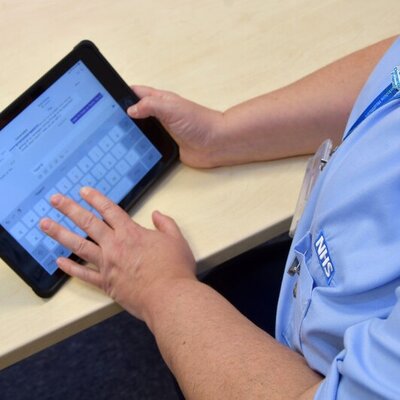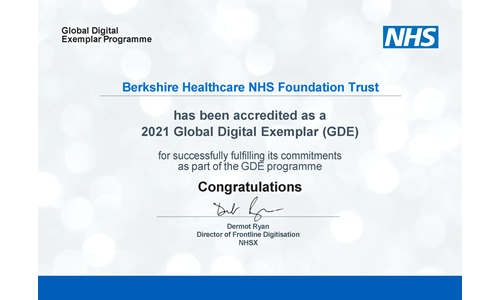We have been accredited as a 2021 Global Digital Exemplar (GDE)

We’re proud to announce our accreditation, for fulfilling our commitments as part of the Global Digital Exemplar (GDE) programme with NHSX.
As a GDE trust, we’re using new and innovative technology to empower our staff and patients, to continue providing outstanding care and further accelerate our digital maturity.
We’re the first of the seven Community and Mental Health NHS trusts in England to achieve GDE accreditation.
Bill Johnston, and Associate Director Digital Transformation, talked about what this accreditation means for our services and patients.
“Being accredited as a GDE trust signals far more than the completion of the GDE programme. Accreditation identifies us as being a leader in digital capability to support improved clinical safety, patient and staff experience. We’re now recognised against an international standard of digital capability and maturity, and being the first Community & Mental Health NHS Trust to achieve this accolade is very special.
Without the engagement and support of our clinical services the programme would not have delivered its goals or achieved accreditation, so a huge thank you goes out to all those involved either directly or indirectly in the GDE programme. We have used the learning and solid foundations gained from GDE programme, plus the feedback and requirements received from staff, to inform the digital strategy which will continue to build on our capability to further support clinical services to deliver outstanding care”
The award was presented by Paul Gilliat from NHSX on 1 February 2022, to members of our Executive Board and GDE Digital Programme leads.

Attendees included our Chief Executive Julian Emms, Deputy Executive Alex Gild, Chief Information Officer Mark Davison, Chief Clinical Information Officer Guy Northover, and Associate Director Digital Transformation Bill Johnston.
Read more about Global Digital Exemplars on the NHS website (opens new browser tab)
Our Digital Transformation projects
Our transformation programme involved 19 projects.
Read more about our Digital Transformation projects (opens new browser tab)
Here are some examples of our projects and the impact they’re having for our teams and patients.
Support, Hope and Recovery Online system (SHaRON)
SHaRON is a secure, clinically-moderated, therapeutic network which links up patients, carers and clinicians in a ‘social media’ style format.
It has enabled over 3,000 patients and their families to confidentially access information to support their recovery and self-management of mental health conditions, such as eating disorders, perinatal mental health, and child and adolescent mental health.
Enhanced Online Support & Signposting
Our three new websites are helping patients and their families find and access our services.
Many of our services now have digital workbooks, guides, and video tutorials to support patients in self‑managing their health, as well as improved signposting to other specialist organisations.
Our new Talking Therapies website for example provides clear information and self-help guidance to people around mild anxiety and mild depression.
Interactive ward information boards and eObservation
We have replaced handwritten whiteboards in our wards, with touchscreen devices which show minute-by-minute updates about patients.
The devices are directly linked to the Electronic Patient Record (EPR) to show critical patients care needs. It also connects to the e-observation system so staff can be alerted if a patient has missed a regular observation.
Virtual consultations for patients
Virtual consultations have provided a new and instant way for our teams to check in with their patients, who may not be able to come into our hospital for their appointments.
At peak use, we increased virtual consultations from 200 virtual consultations a month to over 2,000 a week – contributing to clinical efficiency savings of approximately £600,000 per year of clinical time, and a reduction in ‘Did Not Attend’ rates from 7% to 4%.